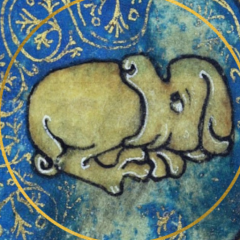We can all agree that this academic year has been a strange one and if the Archives & Special Collections were not regularly cleaned, for the preservation of the collections, I wouldn’t have been surprised to see tumble weed blowing through the well-ventilated Reading Room.
If our students couldn’t come to the collections then the collections would simply have to go to the students, albeit virtually. Advent term was spent honing my filming and editing skills to provide a series of introductory guides to the collections with demonstrations on how to handle rare books and archives. Topics covered FAQs such as, ‘How can I find materials in Special Collections?’, and ‘Can I take photographs of manuscripts?’ These short films are available to view from the Special Collections webpages.

Working alone proved to be quite a physical and time-consuming task; setting up the camera, pressing record, running around the table to gesticulate in front of the camera, and then running back round again to press stop, playback and invariably starting all over again with a re-take. It became increasingly frustrating when I repeatedly fluffed my lines!
I much preferred working closely, or at least socially-distanced, in-between lockdowns, with academic tutors filming the teaching sessions that, pre-Covid, would have taken place in the Reading Room. Filming with colleagues meant I could stay firmly behind the camera. Dr Louise Wilson presented an introduction to Special Collections for our English Literature first-year students, show-casing some of her favourite books as material objects. Dr Kathrin Wagner held a virtual session for first-year Art & Design History students, taking a close look at a selection of illuminated Books of Hours and other religious texts.
Dr Wagner received some very positive feedback from her students:
“To my mind, this extremely well-informed delivery was most effective during Dr Wagner’s tour of the Sheppard-Worlock Special Collections, her expertise on the sacred texts providing invaluable information about the relationship between function and form, decoration and reverence.”
Level C student feedback from Student Portfolio assignment
“A remarkable part on this block was the Special Collections visit at Hope Park library, which under current circumstances had to be carried out online, however was just as superlative.”
Level C student feedback from Student Portfolio assignment
I also worked with Dr Jody Crutchley to produce a series of videos as part of a new course focussed on methodologies for first year History students.
“A huge part of planning this had been giving students first-hand experience in utilising Hope’s amazing archive and special collections resources. However, then the pandemic happened and the shift to online learning meant that this would no longer be physically possible in the Reading Rooms, but we didn’t want the students to miss out. Karen stepped in here with the fantastic videos she produced that we could integrate into an ‘interactive lecture’ session. Students watched several of these short videos and then answered questions on a worksheet. These sessions were incredibly valuable to the students as they still had the opportunity to engage with the handling techniques, collections and gain a general sense of archival research remotely.”
Dr Jody Crutchley
The videos highlighted some of the different formats of material found in our collections, from old manuscripts, personal letters and newspaper cuttings, that you may expect to find in the archives, to the more unforeseen formats, such as, sound archives, photographs and even iconic sculpture and religious images.

Last, but not least, is the filmed session introducing the Nugent Archive. Every year our Education students studying Children’s Rights in Early Childhood, Undergraduate and Masters level, have the opportunity to delve into the Nugent archive to explore what life was like for many children in mid-nineteenth century Liverpool. Father Nugent was a passionate social reformer, appalled by the state of the homeless living in squalor, and dedicated his life to the education and rescue of destitute children. He was also an early pioneer of children’s emigration to Canada. Father Bennett was appointed administrator of the Liverpool Catholic Children’s Protection Society by the Archbishop of Liverpool, and remained for over 40 years. Details of the items in the archive can be downloaded from our webpages.

It would be remiss of me not to publicly thank the editing wizardry of our Multimedia Web Developer, Steven Hargraves, without whom none of these videos would have made it to YouTube. He had a lot of material to work with and not all of it was good!
Looking forward to the academic year 2021-22, I’m hopeful sessions will resume in person. Dr Crutchley has already booked in the History students so I hope this is a sign of things to come. The videos provided an opportunity for students under unusual circumstances and will remain helpful guides, but there’s nothing quite like experiencing archives and special collections in real life.
by Karen Backhouse
Special Collections Librarian




